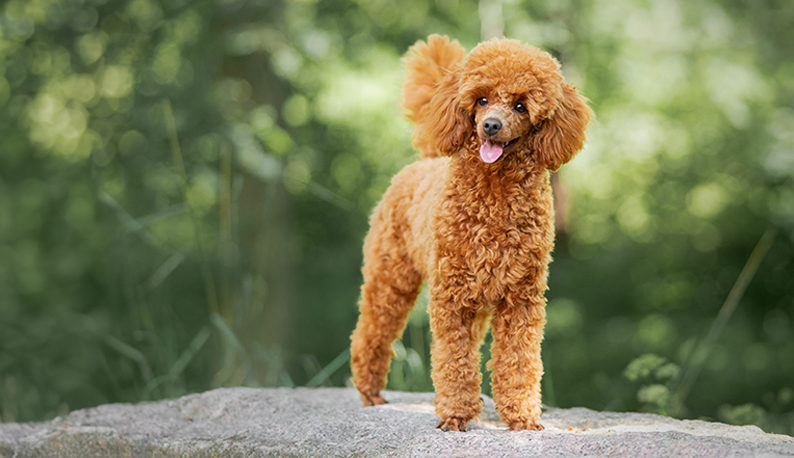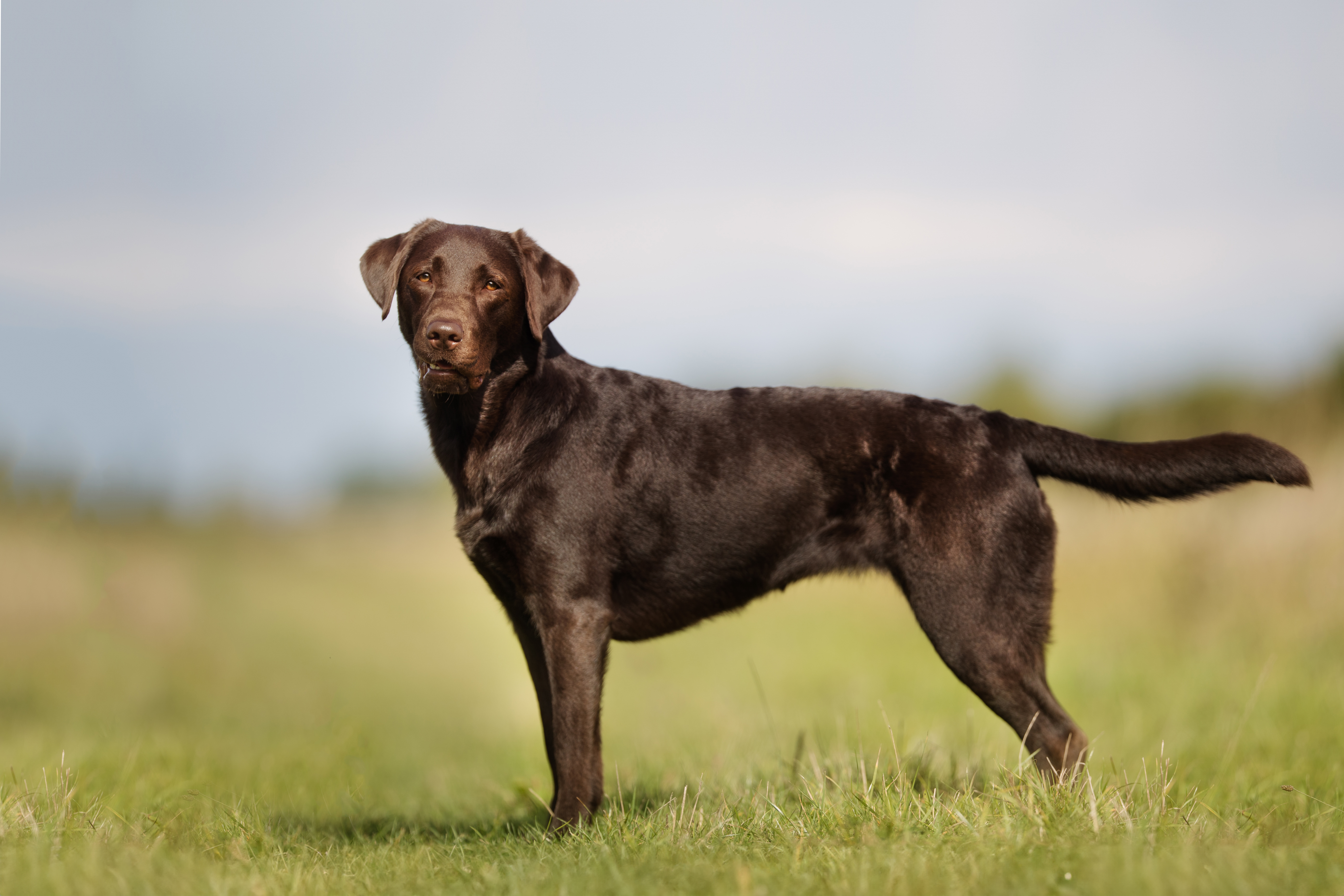The Miniature Poodle is a small dog with a distinctive curly coat and a lively, intelligent personality. Originally bred in France, this breed was highly valued for its versatility and companionship. Despite its elegant appearance, the Miniature Poodle is not just a show dog but also an active and social companion that loves being part of the family. Known for its eagerness to learn, cheerful nature, and strong bond with its owner, the Miniature Poodle is an excellent choice for active families or individuals seeking a smart, affectionate dog with a friendly temperament.
15% off Acana pet food
15% off Acana pet food
Miniature Poodle

Characteristics
Country of origin:
France
Also known as:
Miniature Poodle, Caninche Nain
Body build:
Small and elegantly built, with a strong hindquarters, a straight back, a deep chest, a medium-length muzzle, and a curved tail.
Colours and coat types:
Black, white, brown, apricot, red, silver, and grey. Soft, curly coat with no shedding.
Weight:
5 - 7 kg
Height:
28 - 35 cm
Life Expectancy:
On average, 13 to 15 years
Health risks:
Patellar luxation, eye problems, and hip dysplasia.
Kennel Club Breed Standards:
Utility
Suitable for:
Active, engaged, and loving owners.
Character profile
Eager to learn
Trainability
Social
Energy
Exercise needs
Watchful
Child-friendly
Hunting instinct
Playful
Coat care
Origin of the Miniature Poodle
The Miniature Poodle is one of the oldest dog breeds, though its exact origins remain unclear. It is widely believed to have originated in France. Descended from the Barbet, it was initially bred for hunting waterfowl. Later, the breed was used to retrieve game shot from boats and to locate truffles buried underground. Interestingly, its long, curly coat was ideal for hiding smuggled goods.
The French word “Caninche” (Poodle) is derived from “cane,” the word for a female duck, and the breed was often associated with splashing about in water.
Personality of the Miniature Poodle
The Miniature Poodle is a small dog with a characteristic curly, hypoallergenic coat and a lively, friendly personality. Originally bred as a hunting dog due to its intelligence and adaptability, it has since evolved into a much-loved companion. Thanks to its affectionate and playful nature, the Miniature Poodle is an ideal choice for families, single owners, and seniors alike.
Highly social, the Miniature Poodle easily forms strong bonds with its family and enjoys being part of daily activities. It generally gets along well with children and other pets. Energetic by nature, it loves long walks, games, and mental challenges. This makes it a fantastic choice for people who want to spend plenty of quality time with their dog and are looking for a pet with an elegant appearance and gentle temperament.
All About the Miniature Poodle
What Does the Miniature Poodle Look Like?
The Miniature Poodle has an elegant appearance characterised by its dense, curly, and long coat. Its fur is fine, hypoallergenic, and sheds minimally, coming in various solid colours such as black, white, brown, apricot, and grey. The Miniature Poodle has a small but graceful build, with a well-muscled hindquarters, a deep chest, and a medium-length muzzle. Its high-set tail, elegantly arched over its back, adds to its charming and graceful look.
How Much Exercise Does the Miniature Poodle Need?
The Miniature Poodle is an energetic dog that requires daily exercise to stay healthy and happy. On average, it needs 30 to 60 minutes of physical activity each day. This can include walks, games, or dog sports like agility. While the Miniature Poodle loves being active, it can also adapt to a calmer lifestyle, as long as it receives enough exercise and mental stimulation.
What Care Does the Miniature Poodle Need?
Caring for a Miniature Poodle involves regular maintenance of its curly coat to prevent matting. Weekly brushing and periodic trimming (every 6-8 weeks) are necessary to keep the coat in good condition. Routine checks and care for the eyes, ears, and nails are essential to avoid health issues. Additionally, brushing its teeth daily helps maintain good oral hygiene. The Miniature Poodle also needs daily exercise and mental challenges to stay healthy and content.
What Are the Most Common Health Problems in the Miniature Poodle?
The Miniature Poodle is generally a healthy breed, but it is prone to a few hereditary conditions:
- Progressive Retinal Atrophy (PRA): A condition where the retina gradually deteriorates, potentially leading to blindness.
- Hip Dysplasia: An abnormal formation of the hip joints, which can cause pain and mobility issues.
- Patella Luxation: A condition where the kneecap dislocates, causing pain and lameness.
- Epilepsy: A less common condition that causes seizures.
- Sebaceous Adenitis: An inflammatory skin condition affecting the sebaceous glands.
Which Breeds Are Similar to the Miniature Poodle?
While the Miniature Poodle is a unique breed, it shares some traits with others:
- Toy Poodle: Like the Miniature Poodle, the Toy Poodle has a hypoallergenic, curly coat and an eager-to-learn personality. It is smaller and slightly less energetic.
- Spanish Water Dog: This breed has an energetic nature and a curly coat similar to the Miniature Poodle, but it is sturdier, has a stronger working instinct, and loves swimming.
- Lagotto Romagnolo: With its hypoallergenic, curly coat and intelligent temperament, it shares many traits with the Miniature Poodle. It is larger and has a history as a truffle hunter, highlighting its strong sense of smell.
What Should I Consider Before Getting a Miniature Poodle?
When choosing a Miniature Poodle, there are several important factors to keep in mind:
- Choose a reputable breeder: Look for a breeder with experience who tests the parent dogs for hereditary conditions. A good breeder will openly discuss the upbringing of the puppies, prioritise their health and socialisation, and ensure they go to the right home.
- Costs: The cost of a Miniature Poodle varies by breeder and reflects the time spent on breeding, health testing, and socialising the puppies. A lower price may indicate less attention to these aspects, so it’s always best to choose a recognised and reliable breeder committed to the welfare of the breed.
Who Is the Miniature Poodle Suitable For?
The Miniature Poodle is a versatile dog that adapts well to its environment. However, it does have specific needs that make it better suited to certain types of owners. If you’re considering a Miniature Poodle, it’s important to know whether you can meet these requirements.
The Miniature Poodle is ideal for owners who:
- Are active and energetic
- Are willing to invest time in patient and consistent training
- Want a friendly companion dog
- Seek a social dog that gets along well with children and other pets
- Are prepared to maintain its coat regularly
- Enjoy having a smart and eager-to-learn dog
- Are looking for a small-sized breed
The Miniature Poodle is a perfect choice for those seeking an energetic, intelligent, and loving dog and are happy to commit to its exercise, training, and grooming needs.
Is the Miniature Poodle Suitable for Beginners or Experienced Owners?
The Miniature Poodle adapts well to its surroundings and is highly intelligent. While its coat care and energetic nature can be challenging for beginners, with patience and consistent training, even first-time owners can build a strong bond with this breed.
Experienced owners will appreciate the Miniature Poodle’s intelligence and enjoy its playful, energetic personality.
The Miniature Poodle is suitable for both beginners and experienced owners, provided they have an active lifestyle and are willing to dedicate time to proper training, grooming, and mental stimulation.

Top 10 small dog breeds
This blog article discusses 10 common small dog breeds with the most important characteristics associated with these breeds. Small dog breeds are dogs with an adult weight of up to 10 kg. Are you looking for another small breed? Take a look at our dog breeds page.

What is the best dog food?
The answer to the above question is subjective and depends on your own preference and that of your dog. We’ve made an overview of the most popular diets in every category, using our extensive range of dog foods.

Breed-Specific Dog Food
If you've ever owned a dog, you'll know that every dog is unique. Dogs can have breed-specific characteristics, though, like joint or coat issues. To support these specific characteristics, Royal Canin has created special nutrition that meets the needs of individual dog breeds. Read all about breed-specific dog food in this article!



